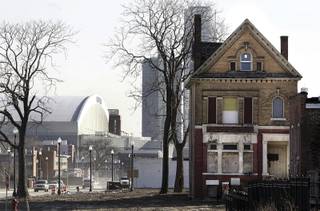Friday, Jan. 1, 2010 | 3 a.m.
Sun Archives
- Lessons Las Vegas can learn from the Rust Belt (10-11-09)
- More Nevadans will need help as economic storm worsens (9-27-2009)
- Nevada's jobless rate could hit 17 percent (9-25-2009)
- The potential for prosperity in Las Vegas (9-9-2009)
- Experts: Despite downturn, Las Vegas has hope (9-8-2009)
Sun Coverage
Las Vegas may have more in common with Pittsburgh and Detroit than many people realize, says Mary Riddel, a UNLV economist and the interim director of the Center for Business and Economic Research.
Riddel, who helped prepare a report for Las Vegas’ 2010 economic outlook, says even with the deep recession Southern Nevada is in, it’s premature to compare the decline to that in Rust Belt cities that have suffered for decades. But Las Vegas is like one-industry cities such as Detroit is to autos and Pittsburgh was to steel manufacturing.
For Las Vegas, the gaming industry is in peril, Riddel says.
“Some would say that tourism will recover, but most analysts agree that the massive expansion on the Strip cannot be successfully repeated,” says Riddel, who adds that no matter the forecast for demand, the Strip is overbuilt. “Clearly, the engine of growth Southern Nevada has enjoyed for so long has run out of gas.”
The recession should prompt people to look to the future and ask what direction should Las Vegas take, Riddel says. Economic diversification has become more important than ever, she adds.
“Diversifying an economy is easier said than done,” Riddel says. “Others have tried and failed where some have succeeded.”
Riddel says she’s worried the Las Vegas economy will be hampered in its recovery because it will have an excess number of rooms.
“The gaming sector is unlikely to have another boom like it has for the past few decades,” Riddel says.
That has massive ramifications because that depresses the construction industry, which has been so important to the economy, she says.
Pittsburgh would be a good model to look to make any transition, Riddel says. When Pittsburgh faced stiff competition from steel manufacturers around the world, the city was forced to change its focus, and it did.
It became a center of exporting steel technology, creating high-income jobs. It invested in its downtown, and today is behind only Chicago and New York City in its number of corporate headquarters.
“Let’s be cautious in talking about Las Vegas,” Riddel says. “Our story hasn’t played out yet, but we are in decline. In my assessment, when we look at the data, we are at the crossroads. What we need is new industry.
“The idea is that we can learn from Detroit and Pittsburgh. We need to look at what resources we have that we can do better and cheaper than other places, and those are the industries we want to go after.”
One way is to start investing in people and higher education because cities and states with the lowest education levels have suffered the worst during the recession, Riddel says. Cities like Denver that are more highly educated have fared much better, she adds.
Riddel isn’t expecting any recovery until 2011 and even that will be modest. It will be several years before the city returns to the level it had two to three years ago, she says.
“I am very worried about where we are going,” Riddel says. “We have taxable sales that are down two years in a row and expected to be down again. We are concentrated on retail trade and gaming as our sources of tax revenue. Unless we diversify, we are going to have real problems in the future. Unless, we are willing to cut our state budgets much more, we need to have some diversity in industry.”
Forecast
Don’t look for a construction boom anytime soon in Las Vegas given the excess in homes and commercial buildings, Riddel says. One count had more than 15,000 homes, apartments and condominiums without prospective buyers or renters, she says.
The Center for Business and Economic Research expects the number of housing-unit permits in 2010 will fall 0.1 percent and increase a dismal 1.5 percent in 2011.
The concern is that prices, which have started to stabilize, are in danger of falling again, Riddel says. The reason is that a homebuyer tax credit artificially inflates prices and when the program ends in 2010, prices might decline again, she says.
Riddel says she expects another wave of foreclosures because many homeowners haven’t been making their payments, and banks haven’t moved against them because they have a backlog. She said banks have no incentive to put every foreclosure on the market right away to further depress prices.
When prices fell in California in past downturns, it took eight to 10 years for them to rebound, and Las Vegas may face that timeline or even longer because prices fell so far, Riddel says.
“I think it is going to be a long time if ever before we see prices like we did in 2006,” Riddel says. “It will take a long time for the market to recover from a bubble such as this.”



Join the Discussion:
Check this out for a full explanation of our conversion to the LiveFyre commenting system and instructions on how to sign up for an account.
Full comments policy